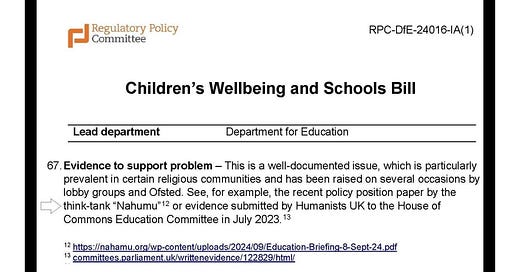The Schools Bill Scandal: Engineered by Anti-Faith Activists. Denied by Ministers. Exposed by Government Evidence
Ministers claimed activist reports had no influence—yet official documents prove those very groups were used to justify legislation that undermines religious and parental rights
A growing storm is gathering around the Government’s controversial Children’s Wellbeing and Schools Bill, as evidence emerges of deep ideological influence from anti-faith pressure groups—despite Government claims to the contrary.
What is now coming to light suggests not merely a lack of consultation with faith communities, but something far more serious: the quiet infiltration and engineering of public policy by anti-faith activists—while Ministers deny that these groups are playing any role in shaping the legislation.
On 5 November 2024, I wrote formally to the Department for Education, raising serious concerns about a 26-page policy paper published by Nahamu—a fringe advocacy group widely known for its hostility toward religion and the Haredi education system.
In that letter, I outlined how Nahamu’s report made sweeping and unfounded claims about Haredi education, depicting the entire community in broadly negative and deeply stigmatising terms. It pushed a hardline agenda of legal interventions, aggressive inspection powers, and the compulsory registration of home education and yeshivas.
But when I raised these concerns, Stephen Morgan MP, Minister for Early Education, replied, stating that “these reports do not constitute government policy.”
That claim has now been fatally undermined. The Government’s official Impact Assessment for the Schools Bill cites Nahamu as a source to justify some of the Bill’s most contentious provisions, while my formal rebuttal of Nahamu’s highly misleading assertions was completely disregarded.
On 5 February 2025, I submitted a follow-up letter to the Minister seeking urgent clarification on this contradiction. No reply has been received to date.
It’s not just Nahamu. The National Secular Society (NSS), known for its persistent anti-faith campaigns, has now openly claimed credit for the Bill. In the House of Lords on 1 May 2025, Lord Paul Scriven praised the NSS by name as one of the original drivers behind the crackdown on so-called “illegal” schools.
The following day, the NSS proudly confirmed its role, stating it was “pleased to see peers from across parties supporting measures to end the scourge of unregistered schools.” It went further, describing the defence of yeshivas by the Lord Bishop of Manchester as “disturbing.”
During Commons debate on 18 March 2025, Labour MP Lizzi Collinge openly credited Humanists UK for its role in shaping the Bill, stating: “I also lay on record my thanks to Humanists UK for its work exposing the dreadful practices in illegal schools over the past decade.”
These are not neutral policy bodies. They are pressure groups with an explicit opposition to faith—driven by a clear aim to indoctrinate children with their ideological worldview, all under the guise of promoting children's wellbeing. And yet, between Lord Scriven, Lizzi Collinge, and official Government documents, their fingerprints are all over this legislation.
Under the European Convention on Human Rights (Articles 9 and 14) and the Equality Act 2010, the Government has a duty to maintain religious neutrality and avoid indirect discrimination.
Legal experts now argue that the Schools Bill is ideologically contaminated. When law is driven not by impartial data, but by groups that are hostile to specific religious minorities, the result is not public-interest legislation—it is political targeting.
This is particularly evident in Clause 36, which poses a serious threat to the future of yeshivas and home education by granting sweeping powers to local authorities to monitor, register, and regulate faith-based settings. Though framed as a measure to protect children's wellbeing, its underlying purpose is clearly to impose a secularist ideological agenda on children.
This is no longer a debate about regulation or standards. It is a constitutional question: Can the UK Government allow ideologically driven campaign groups, openly hostile to religion, to shape education law—while officially denying their involvement?
Faith groups, legal advocates, and civil liberties defenders are now preparing challenges—including calls for judicial review—to expose the true origins and motivations behind the Schools Bill.
With more than 20 peers already expressing concern, and mounting evidence of procedural bias, this is no longer just a policy debate. It is a test of whether the British democratic process is still capable of safeguarding the rights of its minorities—or whether ideological agendas can rewrite the law under the cover of procedural respectability.
Evidence Mounts: Education Policy Shaped by Long-Running Campaign Against Faith Schools
https://www.secularism.org.uk/faith-schools/
https://www.secularism.org.uk/news/2025/04/secularism-key-to-community-cohesion-nss-tells-commission
https://farnham.humanist.org.uk/no-more-faith-schools-do-you-agree/


